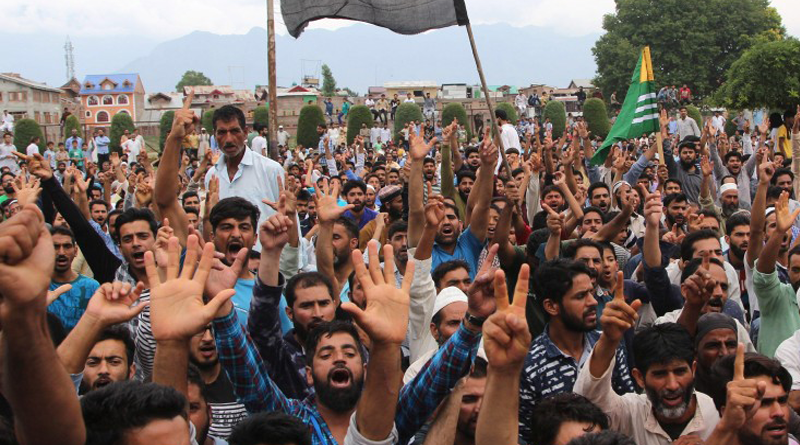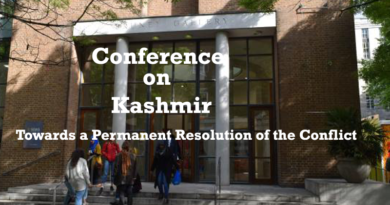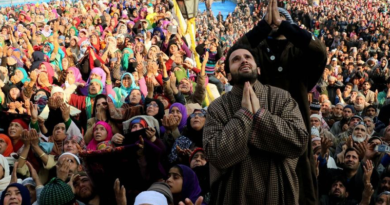What Does the Legitimacy of the Present Freedom Movement in Kashmir Hinge on
The question of moral legitimacy is the most crucial question in any human effort, particularly the one which involves a whole people. Among other ingredients, an important ingredient in bringing about the liberation of Kashmir from India, is the movement inside Kashmir challenging India’s occupation. At the end of the day, it is the ground situation in Kashmir that has pivotal importance. As regards its immediate objectives, this movement must ensure:
a) That Kashmir continues to remain ungovernable for India and,
b) Politically subversive activities by India, like, for example, promoting political proxies, agendas and activities, are constantly kept under check.
However, more importantly, as its long term objective and direction, this movement must ensure that it essentially forms a historical continuation of that persistent resistance against Indian occupation, which has really existed in one form or the other right from 1947. Failure to do that may well deprive the movement of its moral legitimacy. Let us look at it in more detail:
An important thing to know about the pre-89 resistance is that since the people of IOK have been facing Indian army on the ground or its repressive apparatus like the puppet Kashmiri administration and police, the negative target i.e. anti-India prong of the resistance movement has been more visible: crowds being shot at, innocent people being arrested and tortured, etc. etc. However, that does not mean the movement did not have positive aspirations and objectives. No one in his or her senses would tend to think that Kashmiri people, while rejecting India’s occupation of their land all along these years and bearing all the attendant hardships with fortitude, did not have a sense of future destiny. What else could have motivated them if they did not have one? It is only in cases of instigated terrorist and subversive activities that negative objectives are an end in itself, but for popular and persistent resistances it is actually the vision of a future that provides the real motivation. So the sense of future destiny did exist, but it was not repeatedly articulated, debated and discussed for the simple reason that it was taken for granted. Normally the decisions that are taken for granted are those where there is hardly any disagreement and which, in a given set of circumstances, come up as a natural solution to the problem of the day. At the demise of the British Empire, becoming part of the emerging sovereign Muslim political entity, Pakistan, was precisely such a decision, for all the Muslim communities of the region and so for the people of Kashmir too. There is some factual evidence to support that the future destination of anti-India resistance was taken for granted. That would effectively mean there existed a consensus about the future goals, and when we talk of resistance movement against India all along these years, we are essentially talking of a historically developed consensus, surviving the test of time. Furthermore, when it is said, as was above, that the present movement should form a historical continuation of the post-47 anti-India resistance, what is effectively meant is that it should conform to that consensus. Now coming to the factual evidence, it needs to be noted that after India’s occupation the political landscape of Kashmir has remained unevenly divided between puppet politics (regimes, parties, groups, agendas propped up and nurtured by Indian intelligence agencies) and people’s politics rooted in people’s aspirations. Given the fact that the basic dividing line between the two was that in the former Kashmir’s political future was a matter decided, whereas in the latter the people had yet to express themselves on their future, some important questions arise: why is it that in the people’s politics Kashmir’s political destiny did not become a topic, if not the topic, of rigorous debate and discussion? If it was an entirely undecided matter in people’s minds, the question of Kashmir’s political destiny should have been the cardinal issue in people’s politics. Like every other vital issue concerning people’s future, this too should have become a source of agreements and disagreements, and polarization within the camp of people’s politics. Pakistan should have figured in the debate as the central theme with some favouring joining it, some opposing, and yet some others suggesting different options. However, all this did not happen: the camp of people’s politics continued to be a source of resistance to Indian occupation, but not a platform for discussing Kashmir’s political future, and certainly not one for advocating the case of Pakistan, favouring Kashmir’s accession to it, or, for that matter, opposing it. No intellectual movements existed within the camp of people’s politics arguing for Pakistan, or any other option, and trying to win over people to that. As should be clear from the context, it is mainly the time period 1947-89 that is being focussed upon here, the situation after 89 is rather well known. True, pro-Pakistan slogans, as mentioned in the preceding section, did form an integral part of the people’s political culture, but that is something different—-spontaneous expression of one’s feelings—-; what we are talking here about, is the planned and organized efforts of opinion making, floating of ideas etc. etc. One can assume for a moment that the camp of peoples politics was essentially a camp opposed to Indian occupation of Kashmir with an open mind about what the future of IOK should be, and Pakistan as an option was simply ignored, never discussed or debated. Without much reflection, this assumption can be proven wrong: first, the factual evidence says that not only discussion about Pakistan as an option, but an overall debate about options of political future in general has been missing from the discourse of the people’s politics; and second, it was just impossible to ignore Pakistan because technically speaking, with the demise of Dogra empire and change of Kashmir’s political status, both India and Pakistan stood as the occupiers of Kashmir’s territory, so if one occupier is rejected, as was India, and another is apparently ignored, what does that really mean? Ignoring an occupier means accepting it, in other words, not treating it as an occupier. The people of IOK rejected India’s occupation, and this was clear through their practical resistance to India’s presence in IOK, if they had rejected Pakistan’s occupation also, they might have not gone to Muzafarabad to fight Pakistani forces, but the people’s politics would have been doctrinally as much anti-Pakistan as it has been anti-India, if not more. However, as mentioned in the preceding section, pro-Pakistan sentiment has formed the soul of popular political culture in IOK. That is a universally accepted fact.
On the basis of this brief glance that we had of the political landscape of IOK, an important observation can be made: people’s politics in IOK though permeated by pro-Pakistan sentiment, is characterized by absence of discussions on, and debates for or against the Kashmir’s accession with Pakistan, at least until 1989. Before looking at the underlying truth, another interesting observation needs to be made, and this relates to IOK’s puppet politics. Right from 1947, and even some politically crucial period before that, this politics has not only been concerned but almost obsessed with the idea of Pakistan, the state, the leaders, and ultimately with the question of Kashmir’s accession with Pakistan. If one had to count the deeds of IOK’s puppet regimes, and those of the camp of puppet politics in general, one would put their Pakistan-bashing only next to their regime of terror, repression and espionage. Their media, propaganda machinery, organizational apparatus and any and everything at the command of puppet politics was geared to creating hatred for Pakistan, its founding leaders, its underlying ideology, its society and politics. Their impatience in this regard can be gauged from the fact that in early fifties during the puppet regime of Shiekh Mohammad Abdullah, one of his ministers used to forcibly enter the residential houses and smash the radio sets tuned to radio Pakistan.
The observation made about IOK’s people’s politics and the one made about puppet politics are complementary to each other: the conclusion arrived through one is corroborated by that arrived through the other. The conclusion from the former observation is that people’s politics had always a clear sense of future destiny, namely, Pakistan, which was beyond any debate or discussion, hardly needing any sermonising, and, hence, taken for granted. All that the people needed was to get rid of India in order to take the next step, and that is precisely what the people’s politics has been engaged in all through these years. The conclusion from the latter observation is that although India had, by sheer aggression, decided the political future of Kashmir, yet the camp of puppet politics knew fully well that if people in IOK have not accepted this occupied status, as they had not, it is because of their firm political orientation, and a clear sense of future destiny which motivates them for struggle against India’s rule. All along these years puppet politics has been tirelessly working to eliminate that sense.
The discussion so far about the resistance that has historically existed in IOK against Indian occupation, particularly up to 1989, has made it clear that apart from its visible anti-India activism, it had a very clear sense of direction and future destination. When we say the ongoing movement must form a historical continuation of that pre-89 resistance, and not lose the sense of direction, we say so because of solid reasons:
a) It is the pre-89 movement which, in terms of motivated young men, ideological environment, logistic resources, provided the necessary threshold for the present movement to take off. Nothing, and absolutely no other factor, would have made the present movement so successfully take off the ground, if the necessary threshold was not reached in the first place.
b) As is commonly known the present movement received an overwhelming public support at its start in 1989. Generally, the level of popular support grows progressively as the movement, its leaders, program of action get more and more introduced to common masses. With the ongoing movement the case is different: it enjoyed maximum level of popular support at the beginning, which indicates that people perceived it in its historical continuity, that is, not as an altogether new movement, but a new version of a continuing tradition, a new face of that historical struggle that the camp of people’s politics had been putting up all along since 1947. Before the young man fighting India was pelting stones on soldiers, this time he has got something more sharp and effective to use.
c) It follows from (b) that the present movement was perceived by Kashmiri masses as representing the same decades old consensus which formed the basis of anti-India resistance before as well. Based on that perception, they made, and are continuing to make, huge sacrifices in terms of men and material to see through this movement successfully. The moral legitimacy of the present movement, therefore, solely depends on how strictly it adheres to that consensus. If it chooses a new direction now, that is, sets up new objectives like unifying the different parts of Dogra Empire and establishing the so-called independent state of Jammu and Kashmir, that would amount to essentially destroying the consensus. It is nothing short of a blunder to underestimate the value of a consensus that has historically come to exist in a people i.e. the Kashmiri people on a matter of such crucial importance as that of political future. Wise people do not throw away such valuable assets overnight; true, new consensus can be built up anytime, but only if warranted by solid reasons, and not for the sake of it. It also requires a due process. A movement that started with a gun shot, as did the present movement in 1989, cannot claim to have gone through the process of creating a new consensus. Of necessity, it has got to stick to the already existing one; one cannot climb a tree from the top of it.
***
Dr. Syed M Inayatullah Andrabi is a well-known figure in the circles of political Islam. Born in Srinagar, the capital city of Indian Held Kashmir, Dr Andrabi has been intimately involved at the intellectual level with the global politics and political issues since his student days in 1980 at Pune (India), where he completed his Ph.D. in Linguistics in 1983 at the Centre of Advanced Study in Linguistics, Deccan College, University of Pune, Pune, India. Upon completing his doctorate he returned home to join the University of Kashmir, first on a post-doctoral fellowship and later as faculty, but could not continue because of the deteriorating security situation in Kashmir, and had to move to United Kingdom in 1994 where he continues to live since along with his wife and five children.




